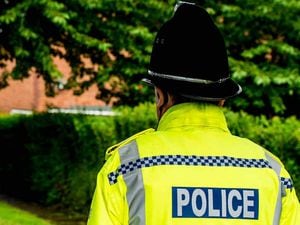What a load of rubbish! How you can help boost the region's recycling record
A look behind the scenes at what happens to the mountains of waste we produce.
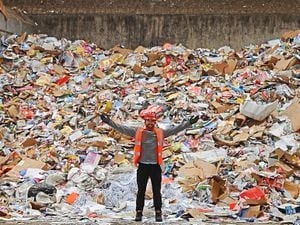
We are standing in front of a mound of rubbish, crushed into neat, cubic bales. About 12ft high, 50ft wide, made mostly of tins, bottles and other recyclables.
While most of it could be reused, sadly, it will have to be burned, because a few well-meaning residents have put the wrong rubbish into the wrong bins.
“People are usually horrified when we tell them about it, they want to do the right thing,” says Sarah Maythorne of Veolia, which looks after the waste contracts for councils across the West Midlands.
The mound is outside the giant material recovery facility (MRF) at Four Ashes, near Wolverhampton, where a huge amount of our waste is taken once we have discarded it.
Separates
And the process by which it is broken apart and either pressed back into service or burned for energy is started in this unassuming industrial building.
Inside this steel-clad hangar a giant, spinning drum known as a trommel separates the contents of the bins into glass, plastic, aluminium and steel.
But if any card, paper or plastic bags find their way into the system, they will block the holes in the trommel and bring the whole process to a standstill.
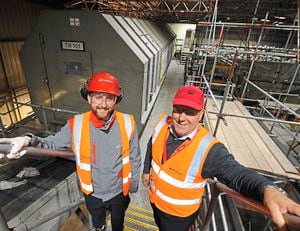
Mrs Maythorne says the problems differ from area to area, and depend on the nature of the contract.
But in Telford two particular problems have been identified: people putting paper and card in with their plastics, tins and bottles, and people putting their recycling inside plastic bags.
Mrs Maythorne says any such contamination can mean that the whole lorry load is unsuitable for recycling.
And that means that all their neighbour’s recycling has to go to the incinerator too.
David Western, 58, is part of the team which collects waste for recycling on behalf of Telford & Wrekin Council.
As he goes about his rounds in Marlbrook Way, Roden, he carries out a cursory check to see if there is anything in the bins that shouldn’t be.
“We only have a quick look, we do not poke around,” he says.
“I would say around one in 10 bins has something in them that shouldn’t be in it.”
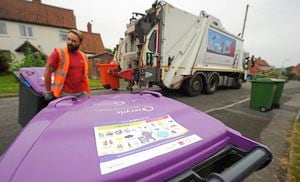
If the level of contamination is minor, the bin will still be emptied, but a note offering advice will be attached to it. But if it is more serious, it will go uncollected.
“We have about 900 reports of contamination a month, out of 76,000 houses,” says David.
Mrs Maythorne insists this is not a case of being difficult, or punishing people for putting their waste in the wrong bin, but rather a way to avoid the whole load from being contaminated.
Once the trucks have completed their rounds, they will arrive at a waste transfer station, such as the one at Hortonwood, Telford, where the vehicles will be weighed to see how much they have collected.
It will then be sorted into three main categories – paper and card; glass, metal and plastic; and general waste which will go to the incinerator.
Each truck will dump its load into a general bay, where it is inspected in more detail.
Any contamination in the recycling will see it put into the bay for general waste.
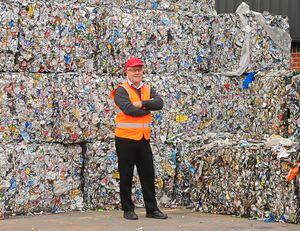
Once it has been sorted into the appropriate categories, it will be taken away from the station on large articulated lorries.
Paper and card will be taken to a papermill in Cheshire, while the glass, plastic and metal will be taken for sorting at the (MRF) in Four Ashes.
The general waste, which includes the contaminated recycling loads, are taken to one of the Energy Recovery Facilities (ERFs) at either Shrewsbury or Four Ashes.
These are specialist incinerators-cum-power stations, which use the waste as fuel to produce electricity.
At the moment, 48 per cent of household waste in Telford & Wrekin is recycled, and 50 per cent used to produce electricity.
“Only two per cent goes to landfill,” says Mrs Maythorne.
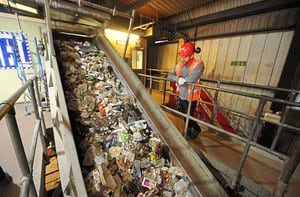
The company is hoping to improve on the recycling rate later this year with the introduction of food caddies in September, which mean that food waste will be turned to compost rather than burned.
At the moment Veolia has contracts to collect kerbside recycling from 58,000 homes in Stafford, 76,000 in Telford & Wrekin, and 120,000 from the rest of Shropshire, although the two sites at Four Ashes take waste from local authorities all over the West Midlands.
Over at Four Ashes, the Material Recovery Facility handles 1,000 tons of recycling every week.
Each truck load is deposited into a loading bay, which carries it onto a belt up to the trommel, which is best described as being like a giant washing machine drum.
As it spins at high velocity, any glassware is smashed into small pieces, which will fall through the four-inch holes into a conveyor below.
The glass is then taken to Derbyshire where it is recycled.
Issues with stray cardboard and paper
It is here where stray cardboard and paper cause the problems, says plant manager Nigel Price.
“Any card will be shredded, and the glue will cause it to form a sticky coating which will block the holes,” he says.
As it continues along the conveyor, a giant magnet removes any ferrous metals – mainly steel drink and food cans – which are deposited into a separate area where they await transportation to South Wales.
The large plastic pieces, such as the bottles, are removed by hand as they pass through a conveyor, where the pickers will remove them at a rate of 60 pieces a minute.
Finally, a device known as an eddy current separator removes the aluminium, the most valuable commodity of the lot, from the plastic, by creating a powerful magnetic field that repels the metal.
Plastic milk bottles are taken to a plant in Dagenham, Essex, where they are turned into small pellets, which are then used to make new bottles.
“From bottle to bottle takes one week,” says Veolia’s Tim Walters.
Metal drinks cans take a little longer to recycle, but the time between them being thrown out and returning to another home is still pretty quick.
Typically, there is a gap of eight weeks from one being put out with the kerbside recycling, and appearing back on the supermarket shelves.
Turning our waste into electrical power
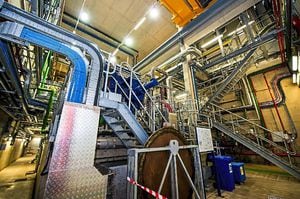
What happens to the waste which can’t be recycled? Since the opening of the two Energy Recovery Facilities at Four Ashes, near Wolverhampton, and Battlefield, in Shrewsbury, almost all of it is now used to produce electricity.
The £122 million super-incinerator at Four Ashes was opened by the Duke of Gloucester in 2014, and over that time has processed 100 tons of waste which would otherwise have been dumped in the ground.
Hilary Hampton, communication and education manager at the plant, says it produces enough electricity to power 66,000 homes. The smaller plant at Shrewsbury, opened by Princess Anne two years ago, produces about half of that.
Between them, the two centres process refuse from Lichfield, South Staffordshire, Stafford, Sandwell, Walsall, Shropshire and Telford & Wrekin. The Four Ashes site takes 100 lorry loads of waste every day, and burns 40 tons of rubbish every hour.
Furnace
Colin Boyle, 34, from the Pelsall area of Walsall, operates the crane which loads the waste material from the bunker where it is dumped into the giant furnace. From a revolving chair with two joysticks on the arms, he controls the giant claw which can lift five tons of waste in one scoop.
The furnace, which has to be kept at a constant temperature of 850C, heats water which is passed through the boiler immediately above, producing steam which is used to turn the turbines that power two generators.
In order to maintain the correct temperature, it is important to ensure that just the right amount of waste is dropped into the furnace. This information is relayed to Colin on a small computer screen.
It is also important to control the amount of oxygen that goes into the furnace, and to control this air is sucked into the bunker which, also controls odours from the site.
The resulting material will be sent for safe disposal at a Veolia, specialist licensed, facility in Cheshire. The cleaned gases are finally released to the atmosphere through the twin exhaust stacks.
Start of the journey, inside the waste transfer station
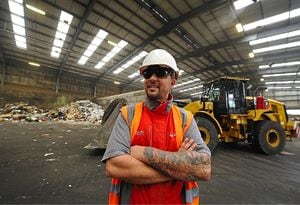
The waste transfer station at Hortonwood in Telford, is the first port of call for the waste that is collected at the kerbside collections in the area, with 120 deliveries arriving every day.
The site is also open to the public who can bring a range of items ranging from electrical goods and furniture through to toys and any other items for recycling they could not fit in their bins.
Sarah Maythorne of Veolia says that the company has a relationship with the Revive charity, which restores old furniture to help people on low incomes furnish their homes.
“If we get something that looks decent, we will take it to them to see if they can do something with it,” she says. Old electrical goods are dismantled for their components.
Used batteries, light bulbs and textiles can also be recycled, but these must not be put into the recycling bins. Residents are asked to put these in a separate see-through bag on top of the bins, so they can be taken to a separate centre in Wednesbury. The plant also handles garden waste.
Plastic-coated card cannot be recycled
Weighbridge operative Jason Corbett overseas the vehicles arriving at the depot from the kerbside collections. First the lorries are weighed, so the amount they are bringing into the site can be recorded, and the contents are then tipped into a loading bay to ensure they are not contaminated.
Paper and card is taken from here to a papermill in Cheshire, and old newspapers can be recycled.
However, plastic-coated card, such as that used in milk and drinks cartons, cannot be recycled, and should not be put in the paper bins.
Kerbside collection staff examine the bins. If there is something which cannot be recycled, the operatives will remove the item and empty the bin, but will leave a note asking residents not to repeat that.
However, if the contamination is more severe, the loaders are asked to photograph contents, record the incident on a hand-held computer, and leave the bin unemptied with a note explaining why this has happened.




